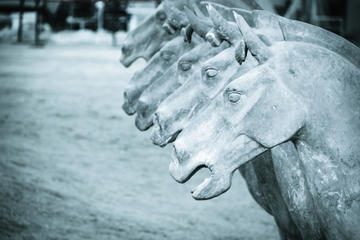Emperor Qins Mausoleum
TIME : 2016/2/22 10:13:42

Emperor Qin's Mausoleum
While the terra cotta warriors have been mostly excavated, their entombed emperor has been resting undisturbed in his mausoleum of underground caverns for over two millennia. Emperor Qin Shi Huang, born in 259 B.C., was China’s first emperor. He conquered six warring kingdoms, joined them and created the first unified nation of China – something no one had managed before. When he died, Qin was buried with the usual artifacts and even live people such as concubines, armies and servants, which was a custom at the time and supposed to be useful in the afterlife. Additionally, and maybe most famously, he was also buried with their clay replicas.
The mausoleum is part of the Emperor Qin Shi Huang's Mausoleum Site Park, which includes a garden, the museum with the terracotta warriors and horses, and Quin’s tomb itself, which can so far only be imagined. Geological surveys prove that the opulent mausoleum is bigger than the Great Pyramid, consisting of a whole underground city resembling the city plan of the ancient capital Xianyang and including a massive palace, pavilions and offices. According to ancient writings, there are believed to be additional pits with the models of concubines, ceilings mimicking the sky and stars and imitations of the region’s rivers made of mercury. The unexcavated mausoleum is located to the west of his famous terracotta soldiers and it is not known, when and if China will allow an excavation. Doing so would not only endanger the treasures hidden and expose them to the elements, making them lose their color like the terracotta warriors, but soil samples have also indicated dangerously high levels of mercury.
Practical Info
Emperor Qin’s Mausoleum is located about 35 kilometers east of Xian in the suburbs of Lintong County, easily accessible by public bus from Xian. Take either the Tourist Line 5, which departs from the east square of the Xian Railway Station, or bus number 307 from the south gate to the correct stop named Bing Ma Yong. Ticket sales are from 8:30 a.m. to 5 p.m. during the summer months and until 4:30 p.m. from November until March. The last entrance is at 6:35 p.m. in the summer and 6:05 p.m. in winter.
